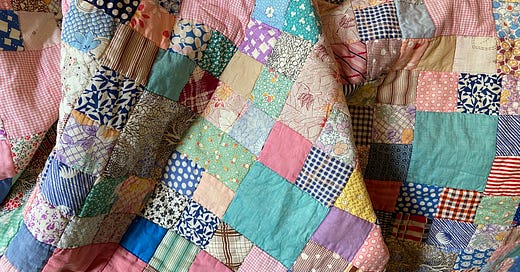There’s something sacred about a patchwork quilt, not just the warmth it offers, but the memories it holds. Each square tells its own story — a scrap from an old shirt, a childhood dress, a vibrant block dyed in defiance of the drab. Quilts are rarely perfect. The seams might be uneven. The colors sometimes clash. But the beauty is in the whole, not the uniformity. A quilt of memories says: You belonged. You mattered. You’re stitched in.
Maybe that’s what makes the quiet unraveling of our public memory so painful.
When we erase people from history — whether it’s trans women at Stonewall or queer names on Navy ships — we’re not just omitting facts. We’re unstitching the quilt. Cutting away the pieces that don’t match a more comfortable pattern. And the more we trim it down to a single color, a single thread, a single shape… the less warmth it holds. The less truth. The less love.
Erasure isn’t just about discomfort. It’s about value. When someone cuts queer, trans, or otherwise “unfamiliar” people from the story, they’re not just saying this doesn’t fit the narrative. They’re saying that part didn’t matter. They didn’t matter.
There’s an arrogance in that — in assuming that because a life isn’t easily understood, it’s somehow expendable. If a piece is merely unfamiliar, that single piece devalues the whole. But that’s never been true. Not in history. Not in quilting. Not in the human spirit.
Last week, the Secretary of Defense ordered the Navy to rename the USNS Harvey Milk.(1)
Harvey Milk was one of the first openly gay elected officials in the U.S. He gave his life fighting for the dignity of queer people. Naming a Navy ship after him wasn’t just symbolic — it was a recognition, a long-overdue acknowledgment that queer lives, too, are part of the American story. That erasure isn't just revision — it’s a retreat from the concept that every life has value and meaning and contributes to the messy and beautiful whole.
The same retreat is happening quietly at the National Park Service’s website for the Stonewall National Monument. (2) You could read the page and never know that trans women of color, drag performers, and queer folks living on the margins were central to that uprising. It reads like history in the abstract, without people. A history without heart.
But the Stonewall uprising didn’t erupt from nowhere. It was the result of years — decades — of being boxed in. Of being harassed, hidden, and humiliated. The people who rose up had been told over and over again: You don’t fit here. You’re not wanted. And when people are pushed into boxes they can’t survive in, when their full humanity is denied again and again, something eventually cracks. Stonewall wasn’t about violence. It was about release. A collective cry from those who had been denied room to simply exist.
Harvey Milk understood that, too. He didn’t ask people to be respectable in society’s eyes. He asked them to be real. To be visible. To be seen not despite who they were, but because of it.
So when we erase this kind of history — when we smooth out the edges to make it more palatable — we lose more than facts. We lose the deeper lesson: that forcing people into neat, acceptable shapes doesn’t lead to harmony. It leads to unrest.
When we’re little, we learn how to sort things. This yellow cylinder fits through this round hole. The blue cube fits through the square hole and so on. It’s useful, up to a point. But eventually, we move beyond the game because real life doesn’t come in pre-approved shapes. People don’t fit neatly into boxes. They’re fluid, complex, and unpredictable. Trying to squeeze someone into categories they were never meant to inhabit only causes pain — for them, and for everyone around them.
When we let go of the need to sort people into neat categories, we begin to see more clearly and listen to their story more deeply. We make room for truth — not just the truth that’s familiar, but the truth that challenges us.
What I’ve seen is this: The people pushed to the margins — the ones who don’t fit, who make us uncomfortable, who disrupt the status quo — are often the very people who move history forward. Their perspectives stretch us. Their courage forces change. Their presence invites us to grow.
When we make space for that kind of discomfort — in our communities, in our institutions, and in ourselves — we don’t just get wiser. We get stronger.
Research shows what lived experience has already taught us: difference makes us stronger.
Katherine Phillips at Columbia found that groups made up of people with different life experiences make better decisions — not because it’s easier, but because it’s harder. (3) They challenge each other. They ask more questions. They don’t fall into group-think. Discomfort creates deeper thinking.
In nature, ecosystems with greater biodiversity are more stable, more adaptable, and more resilient in the face of disruption. The same is true for communities. Uniformity might feel calm on the surface, but it’s brittle. It breaks under stress. It’s the patchwork that holds.
Even in business, the same pattern is true. Companies with more varied leadership are not just more creative — they’re more profitable, because people who see the world differently also see possibilities others overlook. (4)
What if the very people we've been trying to cut out — the ones who don't fit our tidy categories — are the ones who hold the wisdom we need most right now?
I remember seeing images of the AIDS Memorial Quilt when it was first displayed on the National Mall in 1987. Each panel honored one life lost to AIDS — lives the culture had tried to ignore, deny, or forget. The quilt didn’t just remember them. It demanded that we see them. And not just individually, but together — stitched side by side, in public, in plain view.
That’s what real remembrance looks like. Not sanitized. Not convenient. But honest.
The people we’re most tempted to erase — because they confuse us, stretch us, or make us uncomfortable — are often the very ones holding the seams of our shared humanity, inviting us into more love and compassion.
A patchwork community, like a well-worn quilt, isn’t just more beautiful. It’s more resilient, more creative, and more innovative.
When we stitch all the pieces in — even the ones we don’t fully understand, even the ones that we feel awkward in acknowledging — we don’t just preserve the past. We strengthen the future.
Joni Miller, Ph.D., is a writer, researcher, spiritual coach, and speaker who uses her knowledge, education, and love of all things spiritual to help spiritual wanderers find a place they can call home, navigating by the light of Love. www.SpiritualGeography.net
(2)https://www.advocate.com/news/nps-removes-marsha-p-johnson-sylvia-river
Article from February 2025 said the original website said, “Before the 1960s, almost everything about living openly as a lesbian, gay, bisexual, transgender, or queer (LGBTQ+) person was illegal.” Here’s what it says now: “Before the 1960s, almost everything about living authentically as a gay or lesbian person was illegal.” (https://www.nps.gov/ston/index.htm)
(3)https://groups.gsb.columbia.edu/ppil/about-katherine-phillips/
(4)https://www.bcg.com/publications/2018/how-diverse-leadership-teams-boost-innovation













Share this post